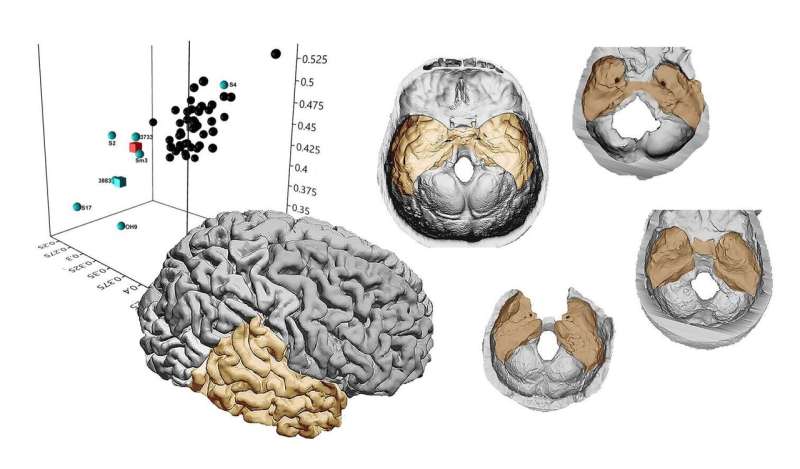Credit: Pearson et al
Emiliano Bruner, a paleoneurologist at the Centro Nacional de Investigación sobre la Evolución Humana (CENIEH), has participated in a study published in the journal Quaternary International, on the anatomy of the temporal lobes in the brain of Homo erectus, which establishes that they were proportionally smaller than in modern humans.
In H. sapiens, the temporal lobes are relatively more highly developed than in other primates, although little is known about their anatomy in extinct human species, because they are housed in a very delicate region of the cranium known as the middle cranial fossa, which is often not conserved in fossil individuals.
An earlier study by the same team had shown that the size of the middle cranial fossa can be used to deduce the volume of the temporal lobes. In this new study, three anatomical diameters were analyzed in fossils of H. erectus and H. ergaster, and compared with the corresponding measurements for 51 modern humans. The results suggest that both fossil species had temporal lobes proportionally smaller than in humans today.
Moreover, "the Asiatic individuals, namely Homo erectus, had larger temporal lobes than in the African ones, Homo ergaster, although the scanty fossil record does not allow us to tell whether this is due to chance or a paleoneurological difference between the two species," says Bruner.
As the temporal lobe is a brain region involved in the integration of many cognitive functions, such as memory, the emotions, hearing, social relations and language, any change in their sizes or proportions is of transcendent importance, as this could reveal variations in the development of their neurons or their connections, and therefore in the cognitive functions associated to this region of the cerebral cortex.
More information: Alannah Pearson et al. Temporal lobe evolution in Javanese Homo erectus and African Homo ergaster: Inferences from the cranial base, Quaternary International (2020). DOI: 10.1016/j.quaint.2020.07.048
Journal information: Quaternary International
Provided by CENIEH
























